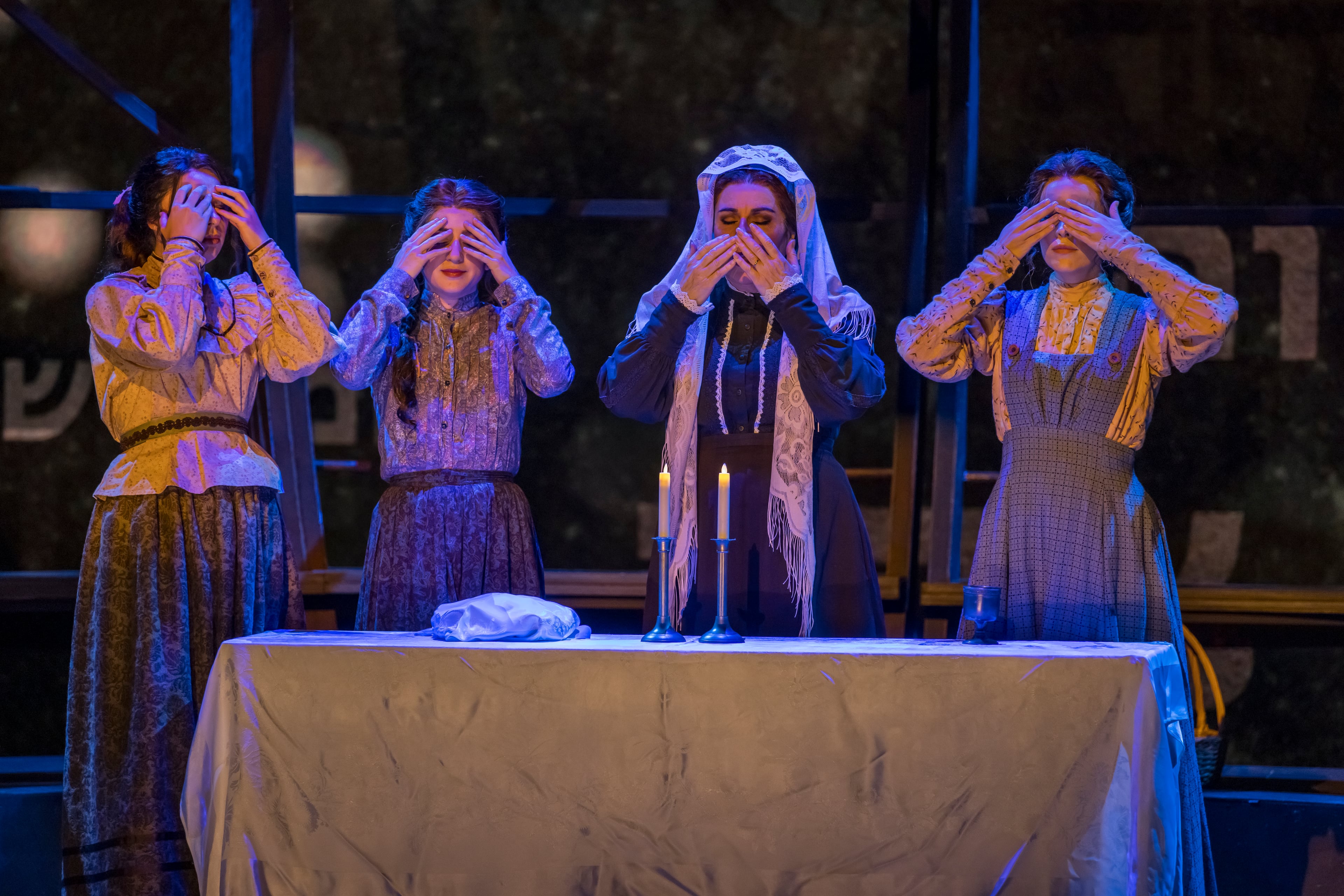Review: ‘Fiddler’ at the Alliance Theatre rises intensely to the moment

This story was originally published by ArtsATL.
Rarely have stories of social unrest, shifting cultural landscapes and people being forced from their homes felt so timely. Despite having been written in the late 1960s, the production of “Fiddler on the Roof” running at the Alliance Theatre through Oct. 12 feels eerily like a reflection of our current political climate.
A co-production with the Atlanta Opera, directed by Tomer Zvulun, the Opera’s general and artistic director, this “Fiddler” staging is simultaneously a delight and a gut punch, with Zvulun, leaning fully into the highs and lows of the classic musical. High-octane group numbers such as “L’Chaim” and “Tevye’s Dream” have the audience bouncing in their seats, primed for the devastating tonal shift wrought at the end of Act 1 as communal joy turns to violent suppression.
Carrying us through these highs and lows is Itzik Cohen as Tevye, a bastion of effervescent charm who is able to delight the audience one minute and move them nearly to tears the next. His rich and layered performance anchors the show — even if his singing voice wavers at times and his “If I Were a Rich Man” is somewhat forgettable.
That is not to discount the other performers, all of whom have a lived-in quality to them — like a community of people who have known each other their entire lives. In particular, Amanda Fallon Smith (Tzeitel), Mia Pinero (Hodel) and Maya Jacobson (Chava) create a palpable sense of sisterhood as Tevye’s three eldest daughters, whose romantic plights drive most of the show’s conflict. Pinero is the biggest standout as Hodel, though; in fairness, her character has always been the most dynamic of the three.

Debbie Gravitte’s Golde is less thorny than other iterations, but she has some lovely banter with Tevye and with Joanna Daniels’ Yente. She and Cohen are undoubtedly the show’s vocal weak links, but the presence they bring to their roles outweighs that downside.
What is most remarkable about Act 1 is the way Zvulun’s direction, along with Chloe Treat’s choreography and Or Matias’ music direction, manages to make each number distinct and memorable. “Matchmaker, Matchmaker” takes on a surprisingly heavy tone as the girls helplessly ruminate on the potential pitfalls of arranged marriage, “L’Chaim” is a blue barn burner with a rip-roaring energy, and “Tevye’s Dream” is an operatic spectacle that’s as hilarious as it is visually striking.
All of this leads up to the “demonstration” scene at the end of Act 1, where Russian soldiers intrude upon Tzeitel’s wedding to wreak destruction on the villagers. While this scene is always sobering, the way Zvulun and fight choreographer Jake Guinn have ratcheted up the violence makes it genuinely hard to watch as the people of Anatevka are brutalized by a fascist regime.
This choice makes clear the production’s approach to the play’s themes. This is not a sotto voce, lean-in-and-listen-type “Fiddler”; every point the story makes is made at a bellow. The soldiers do not just break a few things; they throw innocents to the ground. Perchik, the radical tutor, does not just complain about capitalism, he rages against it.

Visually, the show is something of a mixed bag. The costumes by Vita Tzykun are solid, as is the lighting design by Thomas C. Hase, and Tzykun gets to really show off with the ghostly costumes in “Tevye’s Dream.” Alexander Lisiyansky provides an interesting set design consisting mainly of a large globelike structure that represents the small, insular world the characters inhabit.
Nicholas Hussong’s projections, on the other hand, are more of a hindrance than an asset. They pay dividends during the wedding scene but feel both visually and temporally out of place for the rest of the show. The video montage of Chava during “Little Bird” is particularly tacky, evoking the “In Memoriam” section at the Oscars. Projections would likely work better in a modern deconstruction of “Fiddler,” but, in this production, they come across as theatrical shortcuts. Unfortunately, they only become more present in Act 2, and their utilization for the show’s final moments does somewhat diminish the impact.
Still, the lively staging and fine-tuned performances are enough to overcome this distraction, leaving the audience to sit with the implications of the show’s ending. Its message is clear, hitting at just the right time in history to reverberate through the theater: In times of crisis, upheaval or uncertainty, hold tight to the ones you love and march on.
THEATER REVIEW
“Fiddler on the Roof”
Through Oct. 12 at the Alliance Theatre (coproduced by the Alliance Theatre and the Atlanta Opera). Tickets start around $31. 1280 Peachtree St. NE, Atlanta. alliancetheatre.org.
::
Luke Evans is an Atlanta-based writer, critic and dramaturge. He covers theater for ArtsATL and Broadway World Atlanta and has worked with theaters such as the Alliance, Actor’s Express, Out Front and Woodstock Arts. He’s a graduate of Oglethorpe University, where he earned his bachelor’s degree, and the University of Houston, where he earned his master’s.

MEET OUR PARTNER
ArtsATL (artsatl.org) is a nonprofit organization that plays a critical role in educating and informing audiences about metro Atlanta’s arts and culture. ArtsATL, founded in 2009, helps build a sustainable arts community contributing to the economic and cultural health of the city.


